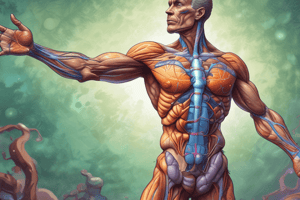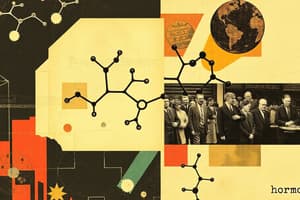Podcast
Questions and Answers
What are steroid hormones primarily derived from?
What are steroid hormones primarily derived from?
- Glucose
- Amino acids
- Fatty acids
- Cholesterol (correct)
Which type of hormone action involves the hormone acting on the same cell that produced it?
Which type of hormone action involves the hormone acting on the same cell that produced it?
- Exocrine action
- Endocrine action
- Paracrine action
- Autocrine action (correct)
Which of the following best describes the property of steroid hormones?
Which of the following best describes the property of steroid hormones?
- They are large and hydrophilic.
- They are lipophilic and low-molecular weight. (correct)
- They are high in molecular weight and charged.
- They require transport proteins for action.
Which endocrine glands are primarily responsible for producing steroid hormones?
Which endocrine glands are primarily responsible for producing steroid hormones?
What is the main reason hormones are quickly degraded?
What is the main reason hormones are quickly degraded?
What is the role of binding proteins in relation to hormones?
What is the role of binding proteins in relation to hormones?
In which cellular structures are steroid hormones synthesized?
In which cellular structures are steroid hormones synthesized?
Which type of hormone action involves the hormone traveling through the bloodstream to distant target cells?
Which type of hormone action involves the hormone traveling through the bloodstream to distant target cells?
What is the primary role of aldosterone in the human body?
What is the primary role of aldosterone in the human body?
Which hormone is produced directly from cholesterol?
Which hormone is produced directly from cholesterol?
What is the significance of stereoisomerism in steroid hormones?
What is the significance of stereoisomerism in steroid hormones?
What distinguishes cortisol from other steroid hormones in humans?
What distinguishes cortisol from other steroid hormones in humans?
What process can cholesterol undergo in the liver?
What process can cholesterol undergo in the liver?
What condition is characterized by excessive cortisol production?
What condition is characterized by excessive cortisol production?
What is the primary function of the Steroidogenic Acute Regulatory protein (STAR)?
What is the primary function of the Steroidogenic Acute Regulatory protein (STAR)?
Which cytochrome P450 enzymes are associated with mitochondrial membranes?
Which cytochrome P450 enzymes are associated with mitochondrial membranes?
What happens to the Cholesterol side chain during the first enzymatic conversion in steroidogenesis?
What happens to the Cholesterol side chain during the first enzymatic conversion in steroidogenesis?
What is a consequence of a mutation in the mechanism of cholesterol transport by STAR?
What is a consequence of a mutation in the mechanism of cholesterol transport by STAR?
What characteristic of steroid hormones allows them to cross plasma membranes?
What characteristic of steroid hormones allows them to cross plasma membranes?
Which class of hormones acts locally by diffusing to nearby target cells?
Which class of hormones acts locally by diffusing to nearby target cells?
What is the primary role of hormones in the body?
What is the primary role of hormones in the body?
What is a common feature of hormone degradation in the bloodstream?
What is a common feature of hormone degradation in the bloodstream?
What is the precursor molecule for all steroid hormones?
What is the precursor molecule for all steroid hormones?
During pregnancy, which unit is responsible for producing steroid hormones?
During pregnancy, which unit is responsible for producing steroid hormones?
What defines the endocrine action of hormones?
What defines the endocrine action of hormones?
Which of the following is NOT a major functional type of hormone action?
Which of the following is NOT a major functional type of hormone action?
Flashcards
Hormones
Hormones
Chemical messengers produced by endocrine cells that travel through the bloodstream to regulate various physiological functions.
Steroid Hormones
Steroid Hormones
A type of hormone derived from cholesterol, acting on target cells via intracellular receptors.
Cholesterol
Cholesterol
The precursor molecule for all steroid hormones, synthesized in the liver and stored in the adrenal glands.
Intracellular Receptor Binding
Intracellular Receptor Binding
Signup and view all the flashcards
Hormone Activation
Hormone Activation
Signup and view all the flashcards
Steroid Hormone Transport
Steroid Hormone Transport
Signup and view all the flashcards
Hormone Recognition
Hormone Recognition
Signup and view all the flashcards
Steroid Hormone Regulation of Gene Expression
Steroid Hormone Regulation of Gene Expression
Signup and view all the flashcards
Steroid Structure
Steroid Structure
Signup and view all the flashcards
Pregnenolone
Pregnenolone
Signup and view all the flashcards
Progesterone
Progesterone
Signup and view all the flashcards
Aldosterone
Aldosterone
Signup and view all the flashcards
Cortisol
Cortisol
Signup and view all the flashcards
What are hormones?
What are hormones?
Signup and view all the flashcards
What are steroid hormones?
What are steroid hormones?
Signup and view all the flashcards
What is cholesterol's role in steroid hormone production?
What is cholesterol's role in steroid hormone production?
Signup and view all the flashcards
What are signal transduction pathways?
What are signal transduction pathways?
Signup and view all the flashcards
How do steroid hormones exert their effects?
How do steroid hormones exert their effects?
Signup and view all the flashcards
Where are steroid hormones primarily produced?
Where are steroid hormones primarily produced?
Signup and view all the flashcards
Why can steroid hormones easily enter cells?
Why can steroid hormones easily enter cells?
Signup and view all the flashcards
Describe the chemical nature of steroid hormones.
Describe the chemical nature of steroid hormones.
Signup and view all the flashcards
What is the role of STAR in steroidogenesis?
What is the role of STAR in steroidogenesis?
Signup and view all the flashcards
What is Congenital Adrenal Hyperplasia?
What is Congenital Adrenal Hyperplasia?
Signup and view all the flashcards
What are Cytochrome P450 enzymes and how are they classified?
What are Cytochrome P450 enzymes and how are they classified?
Signup and view all the flashcards
What is Addison's disease?
What is Addison's disease?
Signup and view all the flashcards
What is Cushing's syndrome?
What is Cushing's syndrome?
Signup and view all the flashcards





